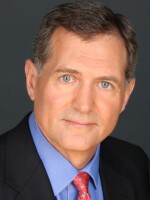MARY LOUISE KELLY, HOST:
Two very large aerospace and defense firms want to become one massive one. Raytheon and United Technologies say they have agreed to merge. This is raising questions about a possible reduction in competition among military contractors. Here's President Trump speaking on CNBC today.
(SOUNDBITE OF ARCHIVED RECORDING)
PRESIDENT DONALD TRUMP: When I hear they're merging, does that take away more competition? It becomes one big, fat, beautiful company. But I have to negotiate, meaning the United States has to buy things.
KELLY: Well, let's bring in NPR national security correspondent Greg Myre. He's in the studio. Hey, Greg.
GREG MYRE, BYLINE: Hey, Mary Louise.
KELLY: What about the president's concerns there that this is going to be one big, fat company and might pose a challenge for competition in the industry?
MYRE: Well, this would create the second-biggest company in this space, trailing only Boeing. And the industry players have been shrinking for decades. There's this sort of long-running consolidation down to a handful of large companies - so certainly a legitimate concern. But when I called Todd Harrison, who very closely tracks military spending at the Center for Strategic and International Studies, he didn't really see it as a big problem.
TODD HARRISON: I don't think that they have a lot of overlap where they have duplicative capabilities. And so it's not really a matter of narrowing the number of companies that could compete for defense contracts in the future.
KELLY: All right, Greg Myre, let's tease that out a little bit. He says there's not a lot of overlap. These companies are doing different things. Are they?
MYRE: Yeah, they are. Raytheon, which dates back almost a century - it's based in Waltham, Mass. - done a lot of non-military things over the years. It invented the microwave oven, for example. But today, think missiles - Tomahawk missiles, the Patriot missile defense system, radar, electronic warfare systems. About 90% or so of its operations are related to military and defense.
United Technologies, based in Connecticut - a real innovator with GPS systems, for example. Today, maybe jet engines is the thing they're most identified with - both military aircraft, things like the cutting-edge F-35 fighter jets but also civilian aircraft, Airbus planes, for example. But only about 25% of their business is defense-related.
KELLY: This merger looking like a done deal?
MYRE: Likely at this point. Shareholders and regulators would still have to approve this, and the new company would be called Raytheon Technologies and based near Boston. Both these companies have very healthy profits. Their stock prices are up. It wasn't some sort of urgent deal that one of them needed to do. They say it's something that's good for business, will allow them to work on their - both of them work on their specialties.
KELLY: And what might this deal tell us, Greg, about overall defense spending, where the Pentagon's overall budget may be heading - any clues in there?
MYRE: Yeah, we don't know for sure. And obviously defense spending has been pretty - up pretty dramatically under President Trump...
KELLY: Yeah.
MYRE: ...Over $700 billion a year, aiming for 750 billion this coming year. But lots of uncertainty - the huge budget deficits. You have Democrats in control of the House, a presidential election next year, so a lot of analysts say they're not expecting big hikes in the defense budget. Look for something more in the line of the rate of inflation, and therefore companies may need to prepare for a new atmosphere.
KELLY: NPR national security correspondent Greg Myre on the case. Thank you, Greg.
MYRE: My pleasure. Transcript provided by NPR, Copyright NPR.




